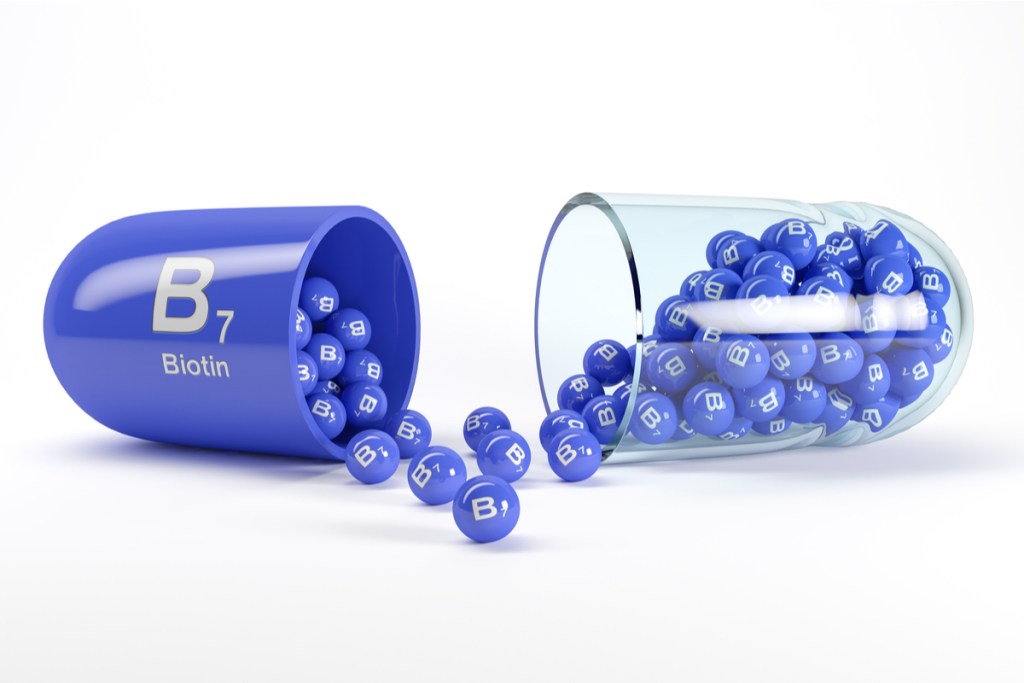
We’re always on the lookout for new products and treatments that will deliver a healthy, voluminous head of hair. Whether you’re on a quest to slow, stop, or reverse thinning hair, or keep your thickness and luster intact, proper hair care is crucial. While there’s no single miracle cure to get rid of bad hair days for good, there are certainly some products and nutrients that can help.
Biotin, for example, is one of the most widely revered treatments. Also known as vitamin B7 or vitamin H, biotin has long been touted as a way to strengthen hair because of its ability to stimulate keratin growth, the protein that serves as the primary building block in every strand of hair.
Considering adding this product into your hair care regimen? Here’s what you need to know about whether biotin treatments are a passing fad or bonafide benefit.

Scientific evidence
To date, there have been very few scientific trials specifically designed to test biotin’s impact on hair growth and other hair-related improvements.
A 2017 review of all available evidence found only 18 studies concerning the effects of biotin on hair and nails. The good news: In all cases, patients showed improvement. The bad news: This is an extremely small sample size, and each case involved someone who had underlying problems with poor hair or nail growth. This likely means that biotin delivers the greatest benefits to people who are managing a damaged mane. If you already have healthy hair, it’s inconclusive just how beneficial the treatment can be.
Keep in mind, though, that inconclusive results don’t mean biotin doesn’t work. If you’re curious, try it out for yourself and see if you notice a difference in your hair’s strength and luster.

Dietary sources of biotin
Whether they know it or not, most people who eat a balanced diet will get their daily dose of biotin through the foods they eat. Many of the foods that already exist in your diet are rich in this vitamin, including:
- Eggs (specifically the yolks)
- Nuts and seeds (like almonds and sunflower seeds)
- Sweet potatoes
- Bananas
- Legumes like beans and peas
- Whole grains
- Mushrooms
- Avocados
In fact, biotin deficiency is so rare that the U.S. Food and Drug Administration has no recommended dietary allowance for the nutrient, but experts generally suggest between 30-100 micrograms for people 10 years of age or older. However, just because you meet the daily recommendations does not necessarily mean you’re getting enough to affect your hair growth. Biotin supplements do exactly what the name implies — supplement your normal intake with a turbo boost of additional nutrition. Over-the-counter supplements vary in their biotin content but generally range from 600-1000 micrograms of biotin per capsule.
Biotin is universally considered safe and does not interact with other medications, meaning there is minimal risk for simply trying a biotin supplement. This gives them a distinct advantage over powerful prescription drugs like Rogaine and Propecia, which come with possible side effects ranging from skin flaking to sexual dysfunction.
Why go with a biotin supplement?
Hair growth is just one of the major benefits of this vitamin — the nutrient also performs several other important functions in the body. By incorporating a biotin supplement into your lifestyle, you can also reduce inflammation, enhance brain function, improve blood sugar control, and increase the levels of HDL (“good”) cholesterol in the body.
While there is not a raft of scientific data to conclude that biotin will improve the health of your hair, it certainly won’t hurt to try. Given its excellent safety profile, affordability, and wide availability over the counter at most drug or grocery stores, there’s little risk in running a biotin experience of your own to see how your hair reacts to the treatment.
It may or may not visibly improve your hair, but you can rest easy knowing your body certainly has enough of the vitamin to keep up the normal processes of keratin building.
BlissMark provides information regarding health, wellness, and beauty. The information within this article is not intended to be medical advice. Before starting any diet or exercise routine, consult your physician. If you don’t have a primary care physician, the United States Health & Human Services department has a free online tool that can help you locate a clinic in your area. We are not medical professionals, have not verified or vetted any programs, and in no way intend our content to be anything more than informative and inspiring.



